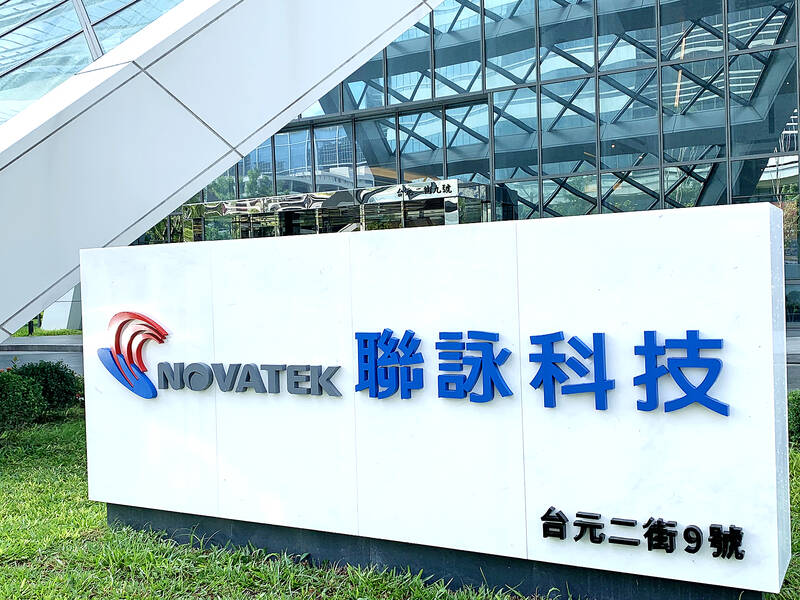Novatek Microelectronics Corp (聯詠), which specializes in driver ICs for displays, forecast that revenue would either be flat or increase by up to 4.4 percent sequentially to between NT$24.4 billion and NT$25.5 billion (US$752 million and US$786 million) this quarter, mainly due to restocking demand for TV chips in preparation for the shopping festival in China and global sports events, including the Paris Olympics.
“The [semiconductor] industry’s inventory has returned to healthy levels following more than one year of adjustments. Now all eyes are on how fast consumer electronics demand would pick up,” Novatek president Steve Wang (王守仁) told an online investors’ conference on Tuesday.
“As global macroeconomic uncertainty and geopolitical conflicts persist, we are seeing a slow recovery in consumer electronics demand. Since three of the world’s major international sports events, including the Paris Olympics, are around the corner, customers are restocking TV chips more actively. China’s 618 [June 18] sales promotions also help,” he said.

Photo: Grace Hung, Taipei Times
TV chips were the biggest revenue contributor last quarter, accounting for 39 percent of the total, the chip designer said.
Demand for driver ICs used in notebook computer displays would be flat this quarter, but Novatek has detected early signs of a pickup next month, and demand for driver ICs for gaming monitor displays would remain resilient, Wang said.
However, demand for driver ICs for small displays, mainly for smartphones, would remain sluggish this quarter, he said.
The company would adopt 22-nanometer technology for touch and display driver integration (TDDI) chips for OLED displays, matching customers’ specification upgrades, Wang said.
Speculation has emerged that Novatek would deploy Taiwan Semiconductor Manufacturing Co’s (台積電) 22-nanometer technology to produce TDDI for OLED displays, rather than its long-term foundry partner United Microelectronics Co (UMC, 聯電). UMC holds a 2.7 percent stake in Novatek.
The company expects a better growth momentum in the second half of this year, when it is to supply OLED display ICs to new customers, he said.
Novatek reported better-than-expected 41.09 percent gross margin last quarter, but expects the figure to slide to between 38.5 and 40.5 percent this quarter.
The company said that higher income for engineering design services for customers — known as non-recurring-engineering (NRE) income — and a better product portfolio helped boosted gross margin in the past quarter.
Novatek expects NRE income to grow this year from NT$880 million last year, thanks to rising demand for tailored-made TV chips, Wang said.
The company participated in Arm Holdings PLC’s design ecosystem in February as part of its plan to expand its application-specific IC (ASIC) business, but does not expect revenue contributions from this partnership in the near term, it said.

Taiwan Semiconductor Manufacturing Co (TSMC, 台積電) secured a record 70.2 percent share of the global foundry business in the second quarter, up from 67.6 percent the previous quarter, and continued widening its lead over second-placed Samsung Electronics Co, TrendForce Corp (集邦科技) said on Monday. TSMC posted US$30.24 billion in sales in the April-to-June period, up 18.5 percent from the previous quarter, driven by major smartphone customers entering their ramp-up cycle and robust demand for artificial intelligence chips, laptops and PCs, which boosted wafer shipments and average selling prices, TrendForce said in a report. Samsung’s sales also grew in the second quarter, up

On Tuesday, US President Donald Trump weighed in on a pressing national issue: The rebranding of a restaurant chain. Last week, Cracker Barrel, a Tennessee company whose nationwide locations lean heavily on a cozy, old-timey aesthetic — “rocking chairs on the porch, a warm fire in the hearth, peg games on the table” — announced it was updating its logo. Uncle Herschel, the man who once appeared next to the letters with a barrel, was gone. It sparked ire on the right, with Donald Trump Jr leading a charge against the rebranding: “WTF is wrong with Cracker Barrel?!” Later, Trump Sr weighed

HEADWINDS: Upfront investment is unavoidable in the merger, but cost savings would materialize over time, TS Financial Holding Co president Welch Lin said TS Financial Holding Co (台新新光金控) said it would take about two years before the benefits of its merger with Shin Kong Financial Holding Co (新光金控) become evident, as the group prioritizes the consolidation of its major subsidiaries. “The group’s priority is to complete the consolidation of different subsidiaries,” Welch Lin (林維俊), president of the nation’s fourth-largest financial conglomerate by assets, told reporters during its first earnings briefing since the merger took effect on July 24. The asset management units are scheduled to merge in November, followed by life insurance in January next year and securities operations in April, Lin said. Banking integration,

LOOPHOLES: The move is to end a break that was aiding foreign producers without any similar benefit for US manufacturers, the US Department of Commerce said US President Donald Trump’s administration would make it harder for Samsung Electronics Co and SK Hynix Inc to ship critical equipment to their chipmaking operations in China, dealing a potential blow to the companies’ production in the world’s largest semiconductor market. The US Department of Commerce in a notice published on Friday said that it was revoking waivers for Samsung and SK Hynix to use US technologies in their Chinese operations. The companies had been operating in China under regulations that allow them to import chipmaking equipment without applying for a new license each time. The move would revise what is known